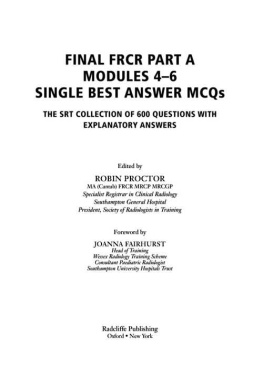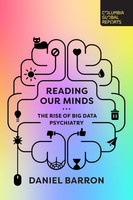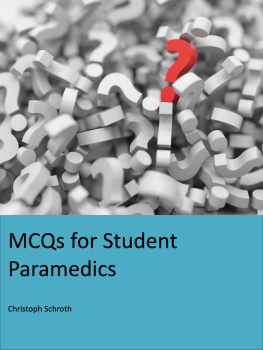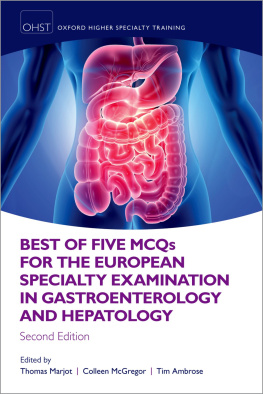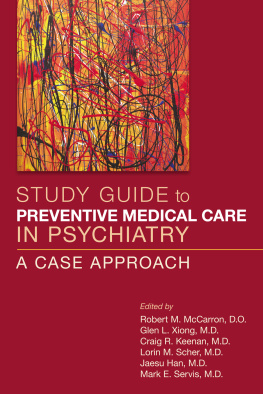Acknowledgements
John Lally would like to thank his parents, Frank & Monica, for inspiring his passion for learning and knowledge and for their continuing support.
John Tully would like to thank all his family for their support and encouragement, and dedicate this book to his mother Ann and his late father Tim.
Both authors would like to thank all those who have provided professional support, guidance and encouragement.
CHAPTER 1
Psychopathology
MCQs
A 24-year-old man describes a belief that MI5 is monitoring his thoughts by means of a microchip, which has been inserted in his head and is being used to remove his thoughts and transfer them to their computer system. He remains adamant about this belief in repeated interviews. What first-rank symptom of schizophrenia is he describing?
(a) Thought insertion
(b) Delusion of control
(c) Third-person auditory hallucination
(d) Thought withdrawal
(e) Thought broadcasting
You assess a 26-year-old woman with a diagnosis of bipolar disorder in the emergency department. She is speaking very quickly and is difficult to interrupt. She scarcely finishes a sentence before starting another. She speaks about a range of topics, but her words make sense and the topics are clearly linked to one another. What sign is she exhibiting?
(a) Pressure of speech
(b) Dysphasia
(c) Tangentiality
(d) Alogia
(e) Circumstantiality
A 45-year-old man with a diagnosis of paranoid schizophrenia is asked about his personal background. He replies to each question by providing a wealth of information, some of which is only loosely related to the question asked. It is difficult to persuade him to get to the point and to elicit the complete history, although eventually he does meaningfully answer each question. Which term most accurately describes this phenomenon?
(a) Tangentiality
(b) Circumstantiality
(c) Loosening of association
(d) Thought block
(e) Derailment
You are assessing a 19-year-old man in an in-patient unit. His thinking seems slow, although he is answering questions. On several occasions, however, he stops mid-sentence and seems unable to recall what he was saying. He tells you that he thinks that another patient is stopping his thoughts. Which term most accurately describes this?
(a) Tangentiality
(b) Thought withdrawal
(c) Loosening of association
(d) Thought block
(e) Derailment
A 54-year-old man with paranoid schizophrenia becomes highly agitated on the ward. You are asked to assess him, but he refuses to come to an interview room. He speaks loudly at you and you can make out his words. However, you cannot elicit any connection between his thoughts. His speech seems jumbled and contains words such as wigwag and homo tapean. Which term most accurately describes his behaviour?
(a) Tangentiality with speech invention
(b) Derailment with neologisms
(c) Thought broadcasting
(d) Thought insertion with dysphasia
(e) Thought withdrawal with pressured speech
A 34-year-old man believes that his neighbours are trying to force him to leave his property. He believes they are sending threatening messages in Morse code through the radiators in his apartment. He also believes they are taunting him by having a small English flag on their car during the World Cup, as he is originally from Poland. He is adamant that he is correct despite you offering alternative and more likely explanations. How would you classify the nature of his beliefs?
(a) Persecutory delusions
(b) Grandiose delusions
(c) Delusions of control
(d) Over-valued ideas
(e) Thought insertion
A 54-year-old woman with a history of bipolar disorder complains that nursing staff on the ward are interfering with her special mission to rid the city of sin. She says she should be allowed to leave the ward and continue her good work. She says she knows she has been chosen by God to do this work as when she prays, she feels full of energy and love. Her husband tells you that although she attends church regularly, these beliefs are new and out of character for her. How would you describe her beliefs?
(a) Nihilistic delusions
(b) Delusions of prayer
(c) Delusions of power
(d) Over-valued ideas
(e) Religious delusions
A 23-year-old man believes that his bowels are being twisted by an alien force that originated on Mars but now lives in Malta. What feature of this delusion makes it more likely that his diagnosis is schizophrenia?
(a) It involves aliens
(b) It involves Malta
(c) It is bizarre
(d) It is a primary delusion
(e) It involves his bowels
A 43-year-old father of three believes his wife is having an affair. He has been examining her laundry and trying to access her email account. There is no basis in reality to his belief and he has no proof to support it. However, he is adamant that he is correct. His wife has tried to reassure him but she feels this is just making it worse. What is this mans diagnosis?
(a) Delusion of love
(b) Morbid jealousy
(c) Sexual envy disorder
(d) Delusion of control
(e) Erotomania
A 65-year-old woman tells you at the out-patient clinic that her husband has been replaced by a double. This person looks the same as her husband and shares the same mannerisms as him, but in her view is certainly not her husband. How would you describe her beliefs?
(a) Folie deux
(b) Delusional infidelity
(c) Delusional interpretation
(d) Capgras syndrome
(e) Delusional memory
A 57-year-old man believes the electricity company is persecuting him by sending error messages on a website and by making the lights flicker on and off at night. As there is no evidence, his wife initially does not believe him, but over time comes to share his belief. What is this phenomenon called?
(a) Folie deux
(b) Delusions of control
(c) Delusional interpretation
(d) Delusions of infestation
(e) Fregoli syndrome
A 33-year-old woman with paranoid schizophrenia describes hearing voices when there is no one around. They are both male and female and they tell her to harm others. She finds them very distressing and it is difficult for her to resist acting on them. How would you describe this symptom?
(a) Sensory distortion
(b) Third-person auditory hallucination
(c) Second-person command auditory hallucination
(d) Pseudohallucination
(e) Autoscopic hallucination
A 23-year-old man describes hearing voices inside his head, talking about him. They say things like I think he should harm himself and also argue between themselves. He cannot dismiss the voices at will. The voices seem real. How would you describe this symptom?
(a) Pseudohallucination
(b) Third-person auditory hallucination
(c) Running commentary
(d) Sensory distortion
(e) Illusion
A 19-year-old college student who has been drinking and taking drugs regularly for several weeks is admitted to hospital feeling unwell. Within a day, he develops the sensation of insects crawling inside his skin. There is no evidence that there are insects there. What is the correct term for his symptom?
(a) Olfactory hallucination
(b) Visual hallucination
(c) Auditory hallucination
(d) Gustatory hallucination
(e) Formication
A 68-year-old man has cognitive impairment and Parkinsonism, but no history of schizophrenia. He complains of seeing spiders in his room during the day over the course of several weeks. He describes them in great detail and seems frightened of them. There is no evidence that there are spiders in his room. What do you think is the most likely cause for this symptom?



